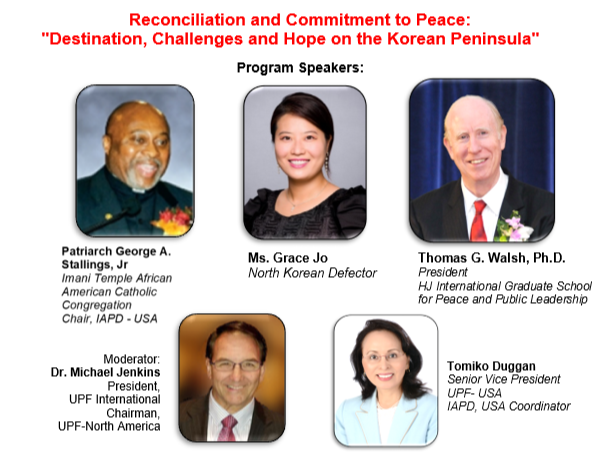IAPD, United States – The Interreligious Association for Peace and Development-USA held its 38th monthly virtual Peace Forum on January 9, 2024, with three featured presenters: Ms. Grace Jo, a North Korean defector; Dr. Thomas Walsh, president of HJ International Graduate School for Peace and Public Leadership; and Patriarch Augustus Stallings Jr., chairman of IAPD-USA. The program was moderated by Dr. Michael Jenkins. The theme of the forum was “Reconciliation and Commitment to Peace: Destination, Challenges and Hope on the Korean Peninsula."
Ms. Grace Jo, born in North Korea, began the program by recounting her difficult life course. She nearly starved to death as a young child – the fate of her brothers. Her father, who left North Korea in search of food for his family, was captured by North Korean agents, tortured, starved, and eventually executed. This treatment was especially cruel since Grace Jo’s father was a Communist Party member, and both parents were loyal to the ideals of the state and the companies they worked for.
Ms. Jo explained that her family moved to the countryside in the 1990s in search of food, where at one point she survived on soup made from a captured field mouse. In 1996, Ms. Jo’s mother, not knowing what happened to her husband and facing starvation, decided to flee to China with her daughters. Her mother and sister were caught and repatriated four times to North Korea, where they faced detention and torture.
During ten years of hiding in China, Ms. Jo met a medical doctor and pastor from Seattle, Washington, Dr. Phillip Pak. After many harrowing experiences, which included 15 months in a Chinese prison and being repatriated to North Korea, Ms. Jo and her two surviving family members escaped North Korea with the help of Dr. Pak. The U.N. Refugee Agency, operating under the U.N. Human Rights Commission, rescued Ms. Jo and her family from China, and with the assistance of North Korean refugee activist Susanne Schulte, they entered the United States as legal refugees.
Ms. Jo and her older sister are two of 370 refugees from North Korea who have settled in the United States. They are currently living in Atlanta, Georgia. In 2013, Ms. Jo became a US citizen.
Dr. Thomas Walsh, who served as chairman of UPF-International for many years, is now president of a graduate school that trains future peacemakers. He gave a broad strategic overview of the Korean situation, related to reconciliation and commitment to peace. He emphasized the things that for millennia have bound Koreans together, including their shared culture, history, enduring social and family values, education, and character shaped by determination, consistency, loyalty and spiritual traditions.
Dr. Walsh described the Korean conflict as “a vital piece of the grand puzzle of current global geopolitical reality, where we have a revival of the Cold War era that essentially still pits what we might refer to as the West, representing liberal democracy and religious freedom, against a more authoritarian political system that does not offer freedom of thought, speech, and media.”
Nevertheless, he suggested focusing on three terms: destination, hope and challenge. Reaching a destination that represents a dramatic improvement from the current reality would require maintaining hope, while examining and facing the challenges inherent in pursuing that goal.
Ultimately, Dr. Walsh said, resolving these geopolitical challenges may require hard power, using political leverage through military threats and economic sanctions. However, soft power can also be effective if those who wield it are well educated and articulate about the issues.
Recognizing God's love, grace, providence, and power, non-state actors such as UPF can assist reconciliation centered on the principles of mutual prosperity, interdependence, and universal values. Dr. Walsh explained that this is done through a practical, inclusive coalition of networks and partnerships, which is why the work of IAPD and UPF’s other associations is so vital.
Patriarch George Augustus Stallings Jr. served as a Roman Catholic priest from 1974 to 1989. He is the founder of the Imani Temple African-American Catholic Congregation.
“Grace Jo’s testimony left an indelible mark on my mind,” Rev. Stallings said. He said that people become hardened to the reality of situations like that in North Korea, but “we can't wait to be concerned about a troubled people in a nation we never visited or know little about.” He quoted Dr. Martin Luther King Jr.: “We are caught in an inescapable network, a web of mutuality, tied in a single garment of destiny.”
Therefore, he said, “What affects one affects all indirectly. It has to impact us all because if some are not free, none are free." As a religious leader, he said, “our approach to peace is through people engagement...I believe that prayer changes things, because prayer changes people. So then people can change things.”




